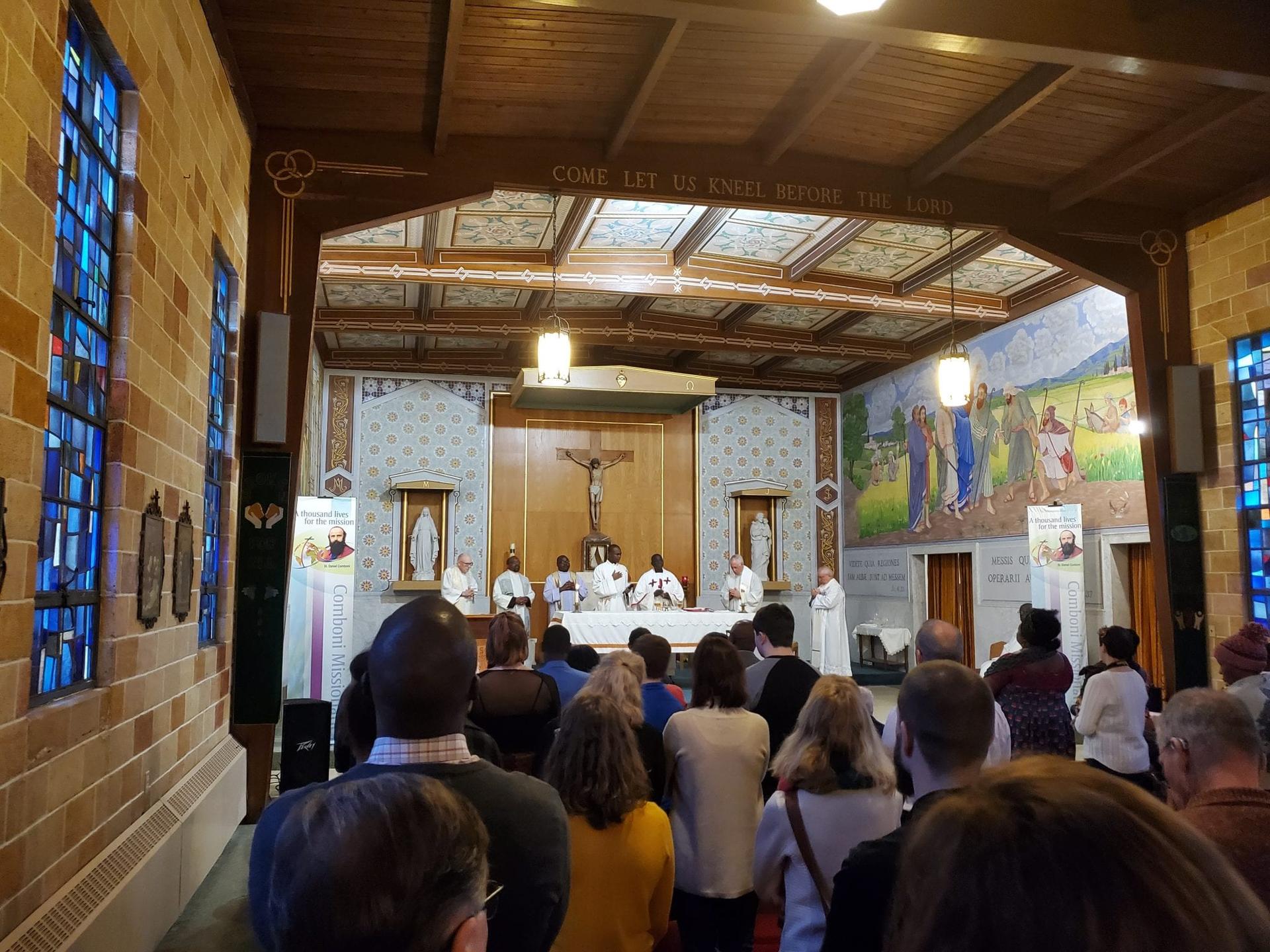CINCINNATI, Ohio – One month after a major pan-African summit wrapped up in Nigeria, Ugandan missionary priest Father Ruffino Ezama is seeking to see if its commitments can be translated into a North American context.
During a Mass at the Comboni Mission Center in Cincinnati, Ohio on Jan. 4, Ezama took the reins as Provincial Superior of the North American Province of the Comboni Missionaries, becoming the first African in the role since the order arrived in the region in 1939.
The outgoing superior, Father John Michael Converset, concluded his homily by handing Ezama his set of office keys attached to a large package, telling him that the package symbolized Pandora’s box, although not all of its contents were bad.
The Mass featured music from Cameroon and the Congo, sung by members of the region’s African immigrant community.
Later that afternoon, Ezama sat down with Crux to reflect on his participation in the Pan African Congress which took place at the world’s largest Catholic seminary in Enugu, Nigeria Dec. 5-8, and share his hopes for bringing the dynamism he experienced there into the life of a province that stretches across the North American continent.
Learning from Africa
According to Ezama, the Pan African Congress offered a resounding “yes” to a question that the increasing vibrancy of the Catholic faith across Africa has been raising: “Is there something that other people can learn from this Church in Africa?”
RELATED: Africans warn numerical growth has to be matched by ‘tools of liberation’
For example, Catholics in North America can learn something, Ezama thinks, from the theology of the people of South Sudan, where peace has proved elusive over the years.
“Theologians are not just these people who read and talk about God,” Ezama told Crux. “The community that remains with eyes fixed on God, they have something to teach, so let us learn… they’re a theologian!”
For Ezama, the resilience and perseverance of the people of South Sudan serve as lessons in holiness, if people are willing to listen. After all, he said, “It is Sudan that made Comboni a saint, and it’s Sudan that made Josephine Bakhita a saint.”
Translating the wisdom of the African Church more broadly, and the Pan African Congress more specifically, into the North American context also centers around harnessing “forces of vitality,” said Ezama.
These positive forces are already active in the Church, Ezama maintained, but they are also often overlooked for various reasons. Chief among those reasons, he suspects, is clericalism.
He said it is often lost on people that only a small percentage of the Church is clergy, and said the Church needs to “go out and fetch out the positive energy” of the laity to “give the Church a different life.”
Ezama pointed to Saturday’s celebration as a simple case in point.
“Someone told me the African choir was very good today,” he said. “They didn’t come with their instruments and they arrived late, and you saw how few they were, but how much joy they gave!”
Citing the vision of his order’s founder, St. Daniel Comboni, Ezama said that “the person is not an empty tin to be filled, but one who brings a new reality and life to the Church.”
From this view of the human person, the Comboni missionary is “like a midwife helping the person’s potential to come to life,” rather than a teacher who says, “You don’t know anything, I’ll be the one teaching you,” explained Ezama.
Giving Voice to the Voiceless? No Thanks!
Since the mid-19th century, the Comboni missionaries have consistently prioritized communications and media efforts on behalf of the people they serve. One Comboni missionary even started his own successful wire service in an effort to share the stories of the missions more effectively.
It was against this background that Ezama brought up the notion of “giving voice to the voiceless,” noting that it’s a common phrase among his Comboni confreres that also surfaced during the Pan African Congress. In a surprise twist, however, Ezama stated, “I say as a son of Comboni, this one expression makes me uncomfortable!”
“During that time in Nigeria at the Congress, I would say, who told you that these people are voiceless?” he continued. “They have voices, but they’ve been muted.” This distinction between voiceless and muted may sound like semantics, but Ezama was quick to say there is an important difference.
“In my home, in my culture, women aren’t supposed to talk in society. But if you go to people’s last names, which are personal names, they are a summary of history or some situation lived by the family. 90 to 95 percent of those names are given by mothers! And yet, they want to say, oh women are not supposed to speak in society! These are the muted voices… let’s give them the microphone.”
As Ezama begins his three-year term as provincial superior, he hopes to operate with what he called a “spirit of gratitude.” He credited the Comboni missionaries, funded in part by money sent from the North American Province, for helping him get through school as a child in Uganda after his father’s passing, when Ezama was just 9 years old.
“Becoming the first African (superior) here is a way of saying, look, I’m a fruit of what you people did, though you probably didn’t see it,” he said. “And this brings us to the oneness of the Church, at the moment where we look at the different backgrounds from where we come and see that each one has a little to contribute.”
Crux is dedicated to smart, wired and independent reporting on the Vatican and worldwide Catholic Church. That kind of reporting doesn’t come cheap, and we need your support. You can help Crux by giving a small amount monthly, or with a onetime gift. Please remember, Crux is a for-profit organization, so contributions are not tax-deductible.















